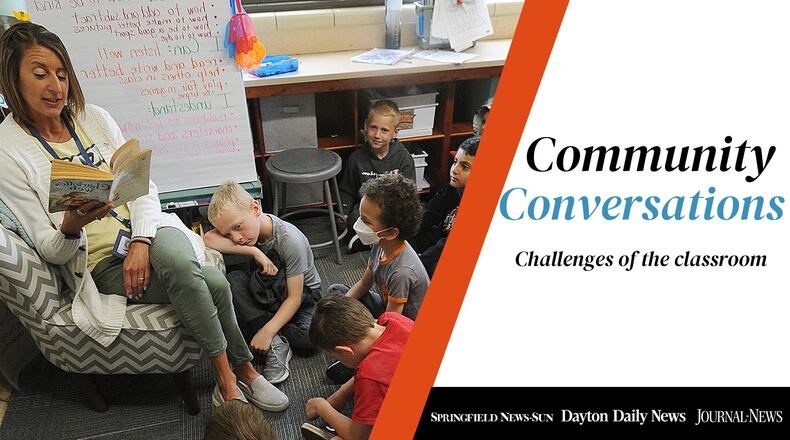- Phillitia Charlton, Emotional Wellbeing Certified Life Coach
- Amanda Deeter, Whole Child Expert in Social Emotional Learning division of the Montgomery County Education Service Center
- Michelle Patrick, Superintendent of the Springfield-Clark Career Technology Center
You can watch a recording of the Community Conversation on our website or on the Dayton Daily News Facebook page.
Editor’s Note: The transcript below has been edited for brevity and clarity.
Credit: Submitted
Credit: Submitted
Phillitia Charlton: Having a high school senior go through COVID, I think one area of growth for me as a parent was just being present. Our kids are really good at pushing us out and we’re really good at moving out of the way because of the distractions, because of the technology, because of the pressures that we have on our own lives. It’s really easy to believe your kids if they’re not saying anything. And so I think as a parent being more responsible and intentional about being present with your child and watching their behaviors. Are they too quiet? Are they too talkative? Are they racing? Has something changed with them? Are they in their rooms a lot? Do you know where they’re going? You could have a child that is performing academically but suffering emotionally. And so sometimes I think that we know what behaviors look like based on academics. And I think as parents, we could all do a better job of learning how to be more present, and really stopping, pausing, asking those questions. Letting my child know, “I know you don’t think you need me because you have Google, or Instagram or Tik Tok, but I’m here for you.” And we are going to have to learn how to have this parenting relationship together because everything has changed. My child, we watched Jeopardy together — so corny — but when we come home, that’s our moment. We cook dinner, we watch Jeopardy, just to humanize. As parents, the best we can do is just take a second and say “Did I really check in with my child today? What am I noticing? What am I observing and where can I show them that love is present and support is here outside of the school?”
Amanda Deeter: One of the things that we’re trying to do is look at organizational care. We have pushed a lot of self-care throughout the pandemic: You got to take care of yourself, you got to take care of yourself. But if our self-care models are not complimented by organizational care, there aren’t structures in place for staff to take care of themselves. We come up against barriers, then we can’t take good care of ourselves. So we’re really trying to support districts to create systems where, when teachers are facing challenges, feel overwhelmed, how do we then put a system in place for teachers to tap out for five minutes when they’re really struggling? So that they’re just not constantly in a situation where they’re experiencing so much burnout. We’ve seen with recent studies that teacher and educator rates of burnout are higher than any other profession. So we have a systemic issue and we’ve got to start looking at that from an organizational point of view. We have well intentioned things that we already do -— we create our sunshine committees, and we try to have little treats. But there are more systemic ways that we have to look at things and we have to put systems into place that allow people to take good care of themselves. Instead of saying, “take good care of yourself,” we have to allow people to take good care of themselves.
Michelle Patrick: When you start to unpack what healthy, safe, engaged, challenged, and supported means, it can look very different from one person to the next. One of the things that we were noticing as kids were coming back from out of the pandemic, overwhelmed from having been at home, was that they understood their own learning loss, they understood their own mental health because of what they were experiencing. We created another counselor role. We partnered at first with our local ESC on our mental health support. Our counselors are great and work specifically with our students and their needs, and with our staff and their needs. We changed our schedule. We had kids taking three academics that were year-round, plus their half-day lab. And that meant academic teachers were teaching six academic courses. So by blocking schedules, teachers now only have four classes a day, so relationships can be built. Students now only have to add additional courses beyond their career tech lab. The stress level there has lessened and we’ve had great feedback from our students. We added a day that we call “Future Ready Fridays,” where every other Friday we have stopped what we’re doing in the classrooms — kids still learn asynchronously — because we think there are some things we could learn from COVID. And one of the things is that students are going to have to learn over their lifetime and to learn in an online, indoor environment. So how can we do that and still support them, still challenge them? And while that’s happening, they get their asynchronous work on those Fridays, we also offer additional career-ready, life-ready and college-ready opportunities that they sign up for and volunteer for where they can just get a debrief, or they stay home and take some mental health and wellness time to themselves. And for our staff, they offer at least a half day session, so they get the other half of the day to catch up and debrief and really give their all to this profession. Overall, we’ve had really positive input in terms of kind of the whole picture of how we’re addressing these issues.



